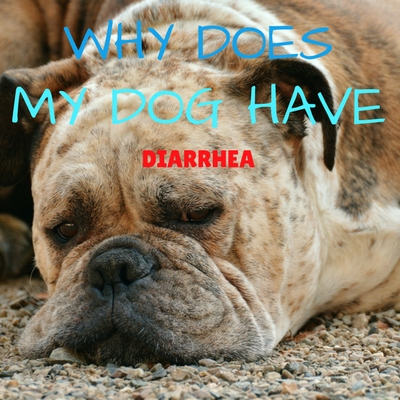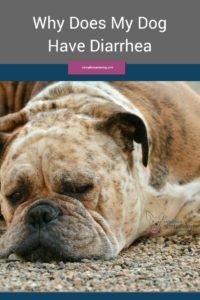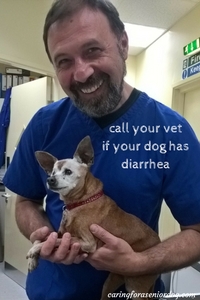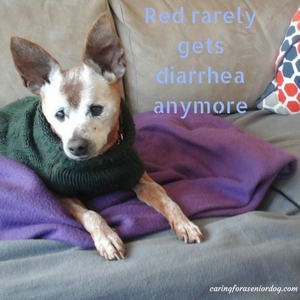
Why does my dog have diarrhea you ask?

You watch him like a hawk when out for your walks. You’re careful about the type of food you give him, and his diet is good quality and surprise surprise!! Your dog is about to poop, and what do you see? Don’t worry; the graphics end there.
I must admit I do panic a bit (okay, more than a bit!) when I notice my dog has diarrhea.
Being a senior dog with quite a few health issues, keeping Red well is a balancing act, which, with the help of my trusted vets, we’re doing a great job of. I do my best to ensure nothing “throws her off,” even though she’s an exceptionally strong dog in all meanings of the word.
Knowing that diarrhea often comes with dehydration, that’s a big concern as dehydration can be deadly, especially in seniors.
Causes of Diarrhea in Dogs
- Eating something off the street
- Getting into the garbage
- Ingesting a toxin
- Reaction to new supplement or medication
- Too much oil such as fish or coconut
- NSAIDs (non steroidal anti-inflammatories)
- Sudden change in diet
- Drinking standing water
- Bacterial infection
- Parasites
- Gastrointestinal disease
- Addison’s disease
- Liver disease
- Inflammatory bowel disease
- Pancreatitis
- Cancer
- Kidney disease
- Intestinal Parasites
- Exocrine Pancreatic Insufficiency

My Dog Has Diarrhea – What Do I Do About It?
The first thing you DON’T do is give your dog some over-the-counter medication someone told you is good for diarrhea in dogs.
I recommend you first check if he/she is dehydrated because it only takes a second.
That’s easily done by gently pinching some fur on the back of your dog’s neck, then releasing it. If the skin goes back into place immediately, that’s a good sign.
If it takes time, that means your dog is dehydrated. The longer it takes, the more dehydrated he is.
Next, call your vet and them what’s been going on and whether or not your dog seems dehydrated.
Don’t wait a day or two to see if the diarrhea clears up on its’ own before calling. Adopting a “wait and see” when it comes to something out of the ordinary with a senior dog is never a good idea.
If you notice blood, you absolutely must tell your vet and get an appointment that day. Tell them you’ll happily sit in the waiting room until you can be squeezed in to see someone.
Try and bring poop and urine samples if you can, as they can be analyzed immediately.
Diagnosis for Senior Dog Diarrhea
Your vet will ask questions such as:
- When it started
- If you noticed him eating anything off the ground
- Did he get into the garbage
- Has anyone been feeding him things he shouldn’t be eating
- Have you changed his diet recently
Anything you can think of, would help your vet figure out the reason.
Urine and poop samples can be analyzed on the spot to give your vet some idea of what’s been going on.
Sometimes they have to be sent off to a lab for further analysis in order to get a definitive diagnosis, but often testing at a vet’s office is enough to at least get your dog started on a treatment plan.
Assess the Dog’s Diet
The first thing that should be done when a dog starts having diarrhea is to assess their diet and what they have possibly eaten in the last 48 hours. Even just drinking from a dirty puddle while you were on a walk could result in tummy troubles.
We also need to be careful about switching the food out because this can cause nausea, vomiting, and diarrhea. The wrong dog food can surely cause an upset stomach and acute diarrhea, especially if your dog also has a sensitive stomach.
Talk to your vet about switching to senior dog food. Older dogs have a much slower metabolic rate and can easily become overweight. Senior dog food formulas are age-appropriate, lower in calories, and easier on a sensitive stomach.
The Dog’s Medications
Many senior dogs are on medications to help with a variety of illnesses and conditions. Some of these medications, including dewormers, NSAIDs, heart medicines, and antibiotics, can cause diarrhea. If the pup is suddenly not feeling well and you have just introduced a new medication, it is worth looking into because it very well may be the cause.
Lifestyle Changes
If you have recently moved, started a new job, or in any way changed your routine at home with your pup, then this can cause emotional stress, especially if you have an older dog. Changes like this can cause different health problems, including diarrhea.
Treatment
The treatment will depend on the cause, but in my experience, your vet will give your dog some anti-diarrhea medication and anti-nausea if he’s been throwing up. You will likely take some home and administer them over the course of a few days.
If your dog seems at all dehydrated, he will be given IV fluids either for a few minutes or several hours, depending on the severity. Rehydration sachets added to drinking water may also be needed.
Your vet may also recommend a few days of a bland diet such as boiled chicken and rice. A wormer will be given if they are detected.
Only your vet can provide you with a treatment plan once all test results are known.
It can be stressful for dog owners when dealing with a sick pup and the mess that comes with it. To help alleviate some of the stress and because it isn’t the dog’s fault, you may want to consider using some doggie diapers. This can help keep the home clean and can minimize accidents.
You can find some machine washable doggie diapers as well for easy cleanup. However, these are more well suited for acute dog diarrhea and should be avoided in the case of severe diarrhea.
Prevention
Keeping your dog in optimal physical and, yes, even mental condition can help him handle upsets more easily than a dog in poor condition.
Give him plenty of physical exercises (the type and duration depending on physical abilities), mental stimulation, a nutritious diet, supplements, and regular vet checks are a great start.
Take care when your dog is running off-leash to make sure he doesn’t get into garbage, which I know can be challenging.
Teaching him “leave it” or “drop it” will go a long way in that if you do catch him with something in his mouth. If he knows that command, there’s a good chance he’ll let it go before he gets a chance to gobble it up.
Ask your vet for a probiotic supplement or other supplements to support his digestive system.
If you are changing over his diet, do it very gradually over the course of at least a week, especially if he seems sensitive to changes.
Do not add supplements or change doses without consulting your vet.
Keep poisonous plants and other potential toxins out of reach.
Don’t let everyone be so “free-handed” when it comes to giving your dog treats or table scraps.

Red and Diarrhea
There was a period of time when Red would get bouts of diarrhea for various reasons. Too often for my liking.
Each time my vet would prescribe Metronidazole, and when she was dehydrated, she would get IV fluids.
I would keep some of the medication here to start her on it immediately and not waste hours until I could get to the vet.
I also keep a rehydration supplement on hand to add to her drinking water to help replace electrolytes. My vet usually recommends it after having fluids to help her continue to recover her hydration levels.
Red recently had a brief episode of vomiting and diarrhea, but that’s because she found something in the grass. I usually have eyes in the back of my head, but this time I didn’t turn around quickly enough when I realized she wasn’t walking with me.
After some quick fluids and anti-nausea medication, she was fine.
Other than that, she hasn’t had diarrhea in several months. I believe that is largely due to a change in her diet and regular acupuncture sessions.
She now eats a home-cooked, whole foods diet, and the acupuncture has boosted her immune system.
Now that she is also seeing a holistic vet, I am looking to move away from medications to more natural treatments whenever possible and safe to do.
Different Types of Dog Diarrhea
Diarrhea is unformed or loose stools that occur in larger quantities and regularly while your dog is sick. It isn’t considered a disease; rather, it is a minor condition resulting from other more serious conditions. However, with the right treatment, it can be helped.
It is important for dog owners to understand the different types of dog diarrhea and what we should watch for.
- Watery Diarrhea: typically has no texture, tends to puddle up and isn’t easily cleaned up. It has the consistency of a thicker soup and may require more extensive cleaning procedures.
- Cottage Cheese Diarrhea: this type of dog diarrhea has a slight texture but still no defined shape. It looks like it is in a pile, but that is not the case when you go and pick it up.
- Moist, Loose Stool: people describe this as having the texture and appearance of soft-serve ice cream (gross, I know). It is moist, has a distinct “pile” shape, and will definitely leave behind a residue when it is picked up.
When Should I Take My Dog to the Vet?
If you have reviewed all the possible causes and have evaluated what could be potentially causing your dog to have diarrhea but still have no answers, it is worth a trip to the vet. Here is when you should take your dog to the vet because diarrhea could be a sign of something more serious:
- Persistent diarrhea that has not stopped over the course of 24 hours
- Dog’s stool appears black in color or contains blood
- The dog is vomiting in addition to the diarrhea
- Your dog appears weak and lethargic
- You know that your dog got into something that was potentially contaminated or poisonous
Why Does My Dog Have Diarrhea – Conclusion
Whatever the cause, diarrhea can be serious if left untreated, particularly when dehydration is present.
Any changes in behavior, peeing and pooping, or physical appearance, no matter how slight, needs to be followed up with at least a phone call to your vet’s office.
You know your dog better than anyone, and if you have a concern, you have to make sure you are heard…and taken seriously.
A “wait and see” attitude is never wise when caring for a senior dog, especially one with health issues, so if your vet doesn’t take you seriously, find one who does.
What treatments have worked for your dog’s diarrhea? Sharing helps others, so please leave your comment in the section below.



Not the funnest of topics, but excellent info! My 8 year old dog used to get diarrhea quite often, unfortunately. He has food allergies and a very sensitive stomach. I started taking him to a holistic vet who spent a lot of time going over his diet with me and we were able to come up with a new diet plan that has pretty much completely cleared up his tummy troubles.
I agree with you there Michelle!! I’m glad you were able to sort out his problem, I actually did the same thing. Once Red saw a holistic vet and had a change to a whole food diet, she stopped having diarrhea.
Diarrhea never escapes attention but often does escape understanding. So many things can cause it. Treating the diarrhea itself can be not only counterproductive but even dangerous.
My rule of thumb is, “one bad poop – no bad poop.” That, of course, with the absence of other signs. There was time when I took Cookie to a vet immediately after just one bad poop because prior that she already looked lethargic and not right. She had pancreatitis.
The main thing with diarrhea is finding and addressing the cause, not the diarrhea itself. (Though sometimes that’s needed as well.)
Hi Jana, thanks for your comment. That’s true so many things can cause diarrhea, and especially in a senior dog with other health issues. The risk of dehydration is high so I make sure the diarrhea is addressed immediately. Of course during a vet’s appointment a cause will be investigated so the treatment is not just a band aid.
Have to giggle as each time Layla has I email the vet to ask questions but he has told me to make sure she drinks which I do and then just give her chicken and rice with some probiotics in and since doing that we have had no problems so I keep probiotics in the house for emergencies. I will not give Layla anything without checking with my vet and thank goodness he has an Ask the Vet email address so I can just email and wait for a reply. It makes life easier and stress free for all of us.
Red takes probiotics as well and I keep a product called Royal Canin Rehydration Support on hand. I add it to the water every once in awhile for Red. It doesn’t prevent dehydration but helps if she’s a bit dehydrated. I found when she was on her whole foods home cooked diet she never got diarrhea. You’re lucky your vet has that service, I imagine my vet would look into implementing such a service if he knew I would call less often…actually I should say the staff at the front desk would be happy!!